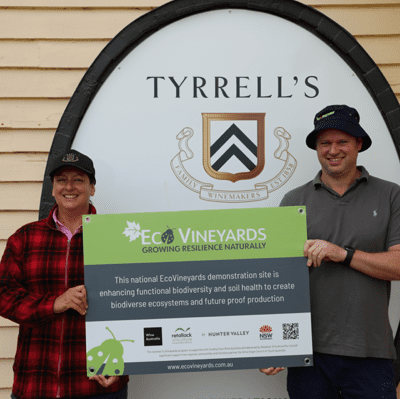Tell us in a few sentences about your experience as a viticulturist, how did you arrive here?
My path into the wine industry began via my Honours supervisor Dr Graeme McIntyre, when I was examining the Crop Factor variation in grapevines across the Pokolbin region. During this two-year period. I spent time in Stellenbosch, South Africa, worked at Brokenwood Wines and Pokolbin Viticultural Services with David Lowe during the university breaks, and completed a Diploma of Viticulture at TAFE, which lead to my employment with Pernod Ricard Pacific (PRP), and my continuation in the industry.
Why did you decide to apply to be an EcoGrower, was there something specific that influenced your decision and/or had you attended a previous EcoVineyards session?
I attended an EcoVineyards workshop in Pokolbin and just knew this was the solution to enabling change in our current soil management practices. The technical support this project offered was a major attraction, along with the programs focus on soil health, and demonstration of the changes achieved through adoption of the program’s principles.
Has there been a defining moment or catalyst for you to move towards more ecologically driven viticultural practices?
Decades ago, the ABC’s Landline program broadcast an episode dedicated to CSIRO’s work on no-till broad acre farming, which demonstrated beneficial changes to soil health, a decrease in P& D incidence, and an increase in water retention through drought conditions. However, it was the regions’ farming communities’ reaction to CSIRO’s results and the mass adoption of its recommendations that left the lasting impression. Then, in 2014, I was introduced to an ecological approach to viticulture through my PRP. I examined leaves for predatory mites, undertook targeted mite releases and conducted routine P & D monitoring for predator insects; the results of which were being taken into consideration when making management decisions. I
think this it has the ability to turn the industry on its head, pave the way for a more sustainable industry moving forward, and address the demand for people wanting wine made sans toxic chemicals and degradative practices.
Can you provide a brief overview of your project ideas, and what you wish to achieve over the 3 years and why is this important to you?
Our project aims to primarily demonstrate that increasing organic soil matter through the adoption of a no till soil management practice and permanent sward improves soil health and mycorrhizal fungi and may contribute to an increase in predator nematode numbers.
During the next 3 years, we will utilise two different types of cover crops and an under vine ground cover to affect nematode numbers, improve soil properties and aid soil moisture retention. Our last soil test returned the comment “…has very little biological activity” so I know this program is imperative for the health of the vineyard moving forward. In fact, this comment is the reason the program is so very important to me. Without implementing the necessary changes this vineyard will quickly become unsustainable. I am keen to address this situation stat, as I see this result-driven program the key to demonstrating the benefits of these.
Are you just starting to learn, or have you been enhancing biodiversity on your property and is this an extension of what you are currently doing? If so, please tell us more.
I am just starting to consider aspects of biodiversity in my decision-making. I have previously utilised parts of it, such as providing habitats for predator mites and insects to over-winter, but not utilised additional parts such as the bat boxes, predator perches or planting of shrubs and trees species to attract nectar-feeding insects. I am looking forward to incorporating more of the eco-vineyard program practices into our management strategies.
Tell us about your hidden superpowers, something that others don’t know about you or a practice you would like to champion?
I would love to champion the development of tailored compost teas. Just as what we eat affects our gut biome, I would love to develop knowledge on the effect a plant has on soil microbiology when used to make a compost tea. For example, is there a particular species of plant that is known to increase fungal species in the soil, which affect root-knot nematode populations?
During my time living at Mission Chapoutier (Hermitage, Rhone Valley), I observed the growing specific plants for use in their teas, which was applied as an adjunct treatment against mildews. This got me to thinking, how much we know about these interactions, which enhance vineyard longevity, without sacrificing the soil beneficials’; it is an area I’d love to explore in the future.
Where do you see grape growing in the future, do you feel there is an urgency to change current practices? If so, why?
Within our Hunter region, I have observed the industry is moving toward a more holistic and integrated approach to vineyard management, which I believe, is the way forward. For the sake of soil health, and thus vineyard sustainability, the practice of cultivation appears to be being phased out in favour of permanent native grass swards. With the adoption of this practice will come targeted cover crops remedying nutrient, physical, or microbiome specific issues, resulting from years of soil degradation from cultivation. With the current global warming predictions, we need to make changes and adapt our practices to future proof our industry.
As the use of AI becomes more prevalent and rapidly evolving, I also envisage the day will come when the majority of vineyards will have moved over to electric, self-recharging, and unmanned, tractors.
What else would you like to share with the broader EcoVineyards community, what gets you excited about the future?
I am heartened to witness the industry becoming proactive, rather than reactive, in its approach to managing vineyards and the environment in which they are situated. This drive toward a more sustainable industry makes me super excited for the immediate future and future generations.

